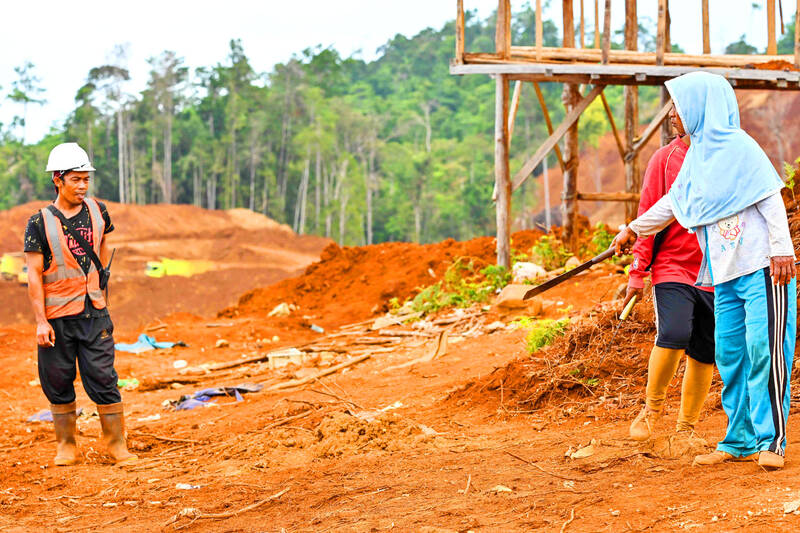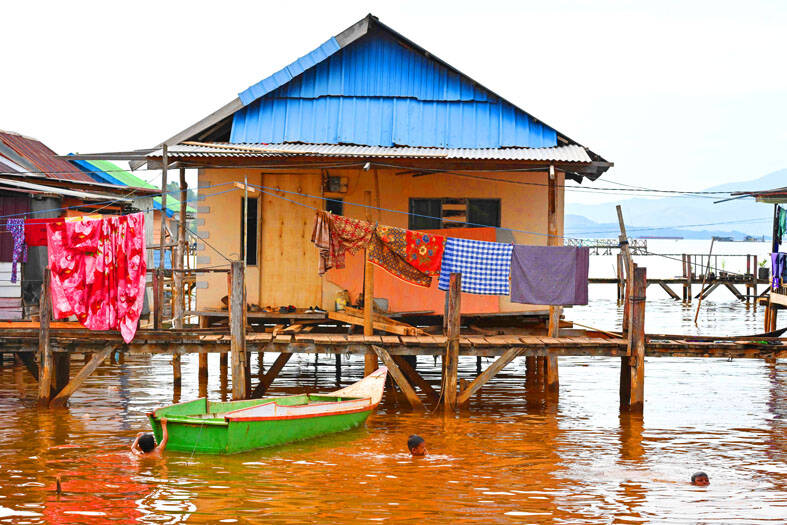Three women with machetes stood guard at their farm hilltop on Indonesia’s Wawonii Island, directing their blades toward the nickel miners working in the forest clearing below.
“I pointed the machete at their faces. I told them: ‘If you scratch this land, heads will fly, we will defend this land to the death,’” 42-year-old villager Royani said, recounting an encounter with some of the miners.
The dig site is part of a huge rush to Indonesia, the world’s largest nickel producer, by domestic and foreign enterprises to mine the critical component used in electric vehicle batteries.

Photo: AFP
Residents and rights groups say that the boom threatens farmers’ land rights and harms the environment in areas such as Wawonii in the resource-rich Sulawesi region, which is home to black macaques, maleo birds and tarsier primates.
Facing the prospect of losing their land and livelihood, about a dozen Wawonii villagers take turns keeping watch from a hut surrounded by clove trees, waiting for trespassers as machinery roars below.
Royani, who goes by one name, joined the effort to safeguard the land after an Indonesian firm cleared hundreds of her family’s tropical spice trees in January.

Photo: AFP
“When we saw there was nothing left, we were destroyed,” she said.
Royani said she wants to protect not just her family’s land from further encroachment, but also her neighbors’.
However, the farmers are up against formidable adversaries.
Soaring global demand for metals used in lithium-ion batteries and stainless steel has pushed major economies such as China and South Korea, alongside electric vehicle giant Tesla Inc and Brazilian mining company Vale SA, to zero in on Indonesia.
Dozens of nickel processing plants now pepper Sulawesi — one of the world’s largest islands — and many more projects have been announced.
Nickel miner PT Gema Kreasi Perdana (PT GKP), owned by one of Indonesia’s wealthiest families, has two concessions on Wawonii totaling 1,800 hectares.
Islanders said it is trying to expand further, with employees repeatedly approaching them for land talks they never asked for.
PT GKP, the Indonesian Ministry of Energy and Mineral Resources and the local energy agency in southeast Sulawesi all declined to comment for this story.
“Even for 1 billion rupiah [US$65,045], I don’t want to sell,” said cashew grower Hastati, 42, whose land has already been partially cleared.
Several protesters in Wawonii have been detained after the land disputes sparked demonstrations, riots and, in some cases, armed confrontations.
Hastoma, a 37-year-old coconut farmer, said he was detained for 45 days last year after clashes between villagers and miners.
Other villagers have blocked miners’ vehicles and set heavy equipment on fire, while some have held miners hostage, restraining them with ropes for up to 12 hours.
“If I keep quiet ... where we live will be destroyed,” Hastoma said, adding that two hectares of his land were seized after his release.
“I will continue to fight to defend our area,” he said.
While land registers in many parts of Indonesia are poorly managed, a presidential decree issued in 2018 recognized farmers’ rights on state lands they use. Citing a 2007 law designed to protect coastal areas and small islands like Wawonii, courts have on several occasions ruled in favor of plaintiffs contesting mining investments.
However, Jakarta is leveraging its resources to entice investors, with many land disputes stemming from overlapping claims due to a lack of adequate ownership checks.
“The problem is permits are often unilaterally issued” by the government, said Benni Wijaya, head of knowledge management and campaigns at the Consortium for Agrarian Reform advocacy group.
“After the permit is issued, it turns out that people have been cultivating the land for years. This is what drives these conflicts,” he added.
Among the leading international investors are Chinese companies.
Indonesian government data showed that Chinese firms pumped US$8.2 billion into the country last year — more than double the 2021 figure of US$3.1 billion.
In central Sulawesi, Chinese companies have set up their own nickel ore processing facilities and even built a nickel museum.
The investments have come at a cost, worsening pollution and stoking tensions over poor working conditions at Chinese-run facilities, including a deadly January riot.
The southeastern Sulawesi coastline has borne the brunt of the environmental impact of the mines.
In a village in the Pomalaa region of the island, stilt houses sit above rust-red sludge where children swim in murky waters.
Contaminated soil from nickel mines brought down the hills by rain has turned the coastal waters of the Pacific Ocean a deep red color, locals said.
“When there were no mines, the water was not like this. It was clean,” villager Guntur, 33, said.
State-owned firm PT Aneka Tambang Tbk is among the firms that have mining concessions in the area.
PT Aneka corporate secretary Syarif Faisal Alkadrie said that “there has been no mining activity” there.
“The company is always committed to implementing good mining practice principles” in its operations, he said, adding that other companies had concessions and operated nearby.
Fishers have also been affected by the nickel pollution, and Asep Solihin said he now has to sail much further than he used to for a catch.
“We are only just able to survive,” said the 44-year-old, who has been involved in protests against the mining projects. “Up there it’s mined, down there is mud. What about the next generation?”
Not all the locals oppose the projects, with some securing work thanks to the investments, while others have seen their small businesses’ profits rise.
Sasto Utomo, 56, built a stall near the smelter in Morosi, where he sells black pepper crab and fried rice.
“I fully support the factories. Previously we could not sell. Thank God my income has increased,” he said, adding he had bought a house and farmland with his earnings.
Indonesia is Southeast Asia’s largest economy, and the World Bank says it has made huge strides in poverty reduction in the past few years.
In a speech last month, Indonesian President Joko Widodo said the country would “keep moving” with the aim of reaching developed nation status.
Farmers like Royani said they would refuse to bow to the industrial drive.
“What can we do?” she said, adding that she spends much of her day standing guard against trespassers.
They have been forced to defend their spaces or potentially lose them forever, said Kisran Makati, director of the Southeast Sulawesi Human Rights Study and Advocacy Center.
“There is no other choice,” he said.

Sweeping policy changes under US Secretary of Health and Human Services Robert F. Kennedy Jr are having a chilling effect on vaccine makers as anti-vaccine rhetoric has turned into concrete changes in inoculation schedules and recommendations, investors and executives said. The administration of US President Donald Trump has in the past year upended vaccine recommendations, with the country last month ending its longstanding guidance that all children receive inoculations against flu, hepatitis A and other diseases. The unprecedented changes have led to diminished vaccine usage, hurt the investment case for some biotechs, and created a drag that would likely dent revenues and

Global semiconductor stocks advanced yesterday, as comments by Nvidia Corp chief executive officer Jensen Huang (黃仁勳) at Davos, Switzerland, helped reinforce investor enthusiasm for artificial intelligence (AI). Samsung Electronics Co gained as much as 5 percent to an all-time high, helping drive South Korea’s benchmark KOSPI above 5,000 for the first time. That came after the Philadelphia Semiconductor Index rose more than 3 percent to a fresh record on Wednesday, with a boost from Nvidia. The gains came amid broad risk-on trade after US President Donald Trump withdrew his threat of tariffs on some European nations over backing for Greenland. Huang further

Macronix International Co (旺宏), the world’s biggest NOR flash memory supplier, yesterday said it would spend NT$22 billion (US$699.1 million) on capacity expansion this year to increase its production of mid-to-low-density memory chips as the world’s major memorychip suppliers are phasing out the market. The company said its planned capital expenditures are about 11 times higher than the NT$1.8 billion it spent on new facilities and equipment last year. A majority of this year’s outlay would be allocated to step up capacity of multi-level cell (MLC) NAND flash memory chips, which are used in embedded multimedia cards (eMMC), a managed

CULPRITS: Factors that affected the slip included falling global crude oil prices, wait-and-see consumer attitudes due to US tariffs and a different Lunar New Year holiday schedule Taiwan’s retail sales ended a nine-year growth streak last year, slipping 0.2 percent from a year earlier as uncertainty over US tariff policies affected demand for durable goods, data released on Friday by the Ministry of Economic Affairs showed. Last year’s retail sales totaled NT$4.84 trillion (US$153.27 billion), down about NT$9.5 billion, or 0.2 percent, from 2024. Despite the decline, the figure was still the second-highest annual sales total on record. Ministry statistics department deputy head Chen Yu-fang (陳玉芳) said sales of cars, motorcycles and related products, which accounted for 17.4 percent of total retail rales last year, fell NT$68.1 billion, or